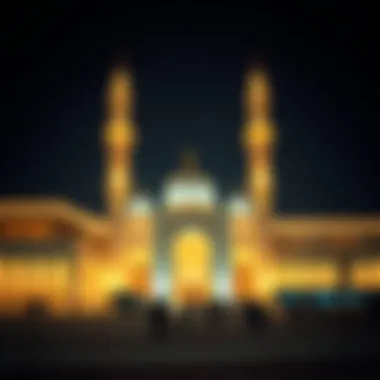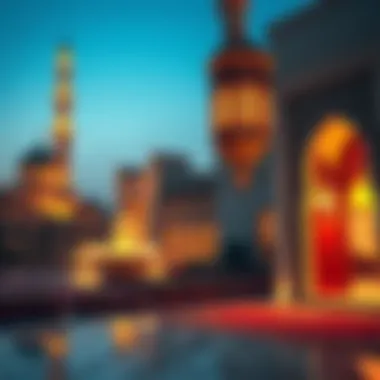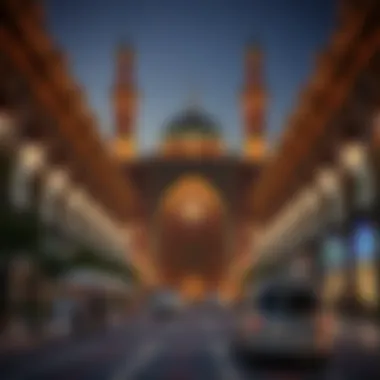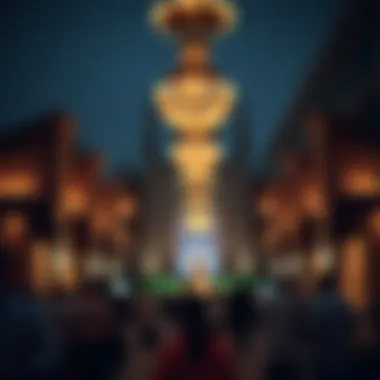Eid al-Fitr in the UAE: Significance and Celebrations


Intro
Eid al-Fitr is a momentous occasion celebrated by millions around the world, but in the United Arab Emirates, its significance resonates on multiple levels, influencing various facets of society. This holiday, marking the end of Ramadan, brings a wealth of traditions and practices that vary from emirate to emirate, creating a tapestry of cultural richness.
In the UAE, the importance of Eid al-Fitr transcends its religious roots. It serves as a powerful driver of economic activity. The festive period typically initiates a surge in retail, travel, and hospitality sectors, all of which thrive during this vibrant time. Understanding these trends and dynamics is crucial for investors and business professionals aiming to navigate the market intelligently.
The following sections will meticulously explore the current market trends surrounding Eid al-Fitr, along with future projections that may impact stakeholders. Investment strategies will also be discussed, highlighting key neighborhoods for potential growth and offering tips for first-time investors who wish to capitalize on this unique holiday-driven economy.
By diving into the heart of Eid al-Fitr traditions and their implications, this article targets a discerning audience, focusing on how this festive occasion shapes not only individual lives but also broader economic landscapes in the UAE.
Understanding Eid al-Fitr
Eid al-Fitr is more than just a festive occasion; it represents a pivotal moment in the life of Muslims, particularly in the United Arab Emirates. This holiday signifies the end of Ramadan, a month dedicated to fasting, prayer, and reflection. The essence of Eid transcends mere celebration, as it embodies community spirit, religious observance, and cultural heritage. To comprehend the importance of Eid al-Fitr, one must unpack its various facets — from its historical roots to its religious significance. Understanding these elements is crucial for anyone looking to grasp the broader implications of this period on society and the economy in the UAE.
Historical Background
The origins of Eid al-Fitr hark back to the time of the Prophet Muhammad in the 7th century, who established this day as a celebration of gratitude for the strength and resilience shown during Ramadan’s fast. The name itself translates to "Festival of Breaking the Fast", which elegantly captures its spirit. Traditionally, the first Eid was celebrated shortly after the battle of Badr, an event that underlined community unity and collective faith. In the UAE, this historical context anchors the celebrations firmly within a framework of shared values and cultural identity. Over the years, as the UAE evolved from a collection of small tribes to a thriving federal state, Eid al-Fitr became an integral part of its national identity, promoting togetherness among diverse populations.
Religious Significance
From a religious viewpoint, Eid al-Fitr is a time of spiritual renewal and communal harmony. It involves not just personal reflection but also communal prayer at mosques and open spaces. This festival serves to rejuvenate the bonds among Muslims by emphasizing charity, with mandatory alms (Zakat al-Fitr) provided before the Eid prayer. This act ensures that those in need can also partake in the celebrations, reflecting the Islamic principles of compassion and community support. In the UAE, prayers are conducted in grand mosques, with thousands coming together, showcasing the beauty of unity in diversity. Moreover, the day is marked by a palpable sense of joy and gratitude, enriching the spiritual fabric of society.
Global Observances
Around the globe, Eid al-Fitr is honored with varying customs and traditions, showcasing the rich tapestry of Islamic culture. As different countries embrace unique practices, the core principles remain unchanged: thanksgiving, family gatherings, and communal prayers. For instance, in Indonesia, the holiday marks a vibrant celebration with colorful parades and festive meals, while in Turkey, traditional dishes are a focal point—each connected to the local cultural context. In Western nations, the celebration might manifest through community events that aim to educate and involve the broader public, fostering intercultural dialog.
Interestingly, the global observance of Eid al-Fitr has also become an opportunity for local businesses to engage with the community. In many places, retailers prepare for increased demand, highlighting the intertwining of cultural celebrations with economic activities.
Eid al-Fitr serves as a bridge that connects not only individuals but entire communities across different cultures.
Whether one is in the UAE or beyond, the essence of Eid al-Fitr resonates with a spirit of inclusivity and togetherness, making it a significant opportunity to celebrate community values and relationships.
Cultural Celebrations in the UAE
Cultural celebrations play a fundamental role in the life of the United Arab Emirates, especially during Eid al-Fitr. This holiday is not merely a day of festivities; it represents a coming-together of families, communities, and cultures in a spirit of joy and gratitude. Understanding the essence of these celebrations offers insights into the UAE’s rich tapestry of traditions, its values, and how they resonate within the modern global context.
Rituals and Traditions
Rituals during Eid al-Fitr are steeped in meaning and reflect both Islamic principles and local customs. The day often begins with a special prayer known as the Eid prayer, usually held in large congregations at mosques or open fields. This is much more than just a formal obligation—it's a communal event where individuals gather to embrace their shared faith.
Communities across the UAE often engage in elaborate preparations leading up to the day. One of the notable customs is the Zakat al-Fitr, a form of charity given to the needy before the Eid prayer. This practice emphasizes the importance of helping those less fortunate and reinforces social solidarity.
Following the prayers, families often proceed to visit the graves of loved ones, expressing their love and remembrance, reconnecting with those who have passed on.
Food and Festivities
The celebration of Eid al-Fitr would be grossly incomplete without a spread of traditional dishes that tantalize the taste buds. Families showcase their culinary skills with hearty meals—dishes like lamb biryani, samosas, and dates are often the stars of the table.
Each emirate has distinct flavors. For instance, in Abu Dhabi, you might find shawarma corners bustling with customers, while Dubai showcases lavish buffets in luxury hotels. In homes, it's common to serve traditional Arabic coffee and sweets like baklava and maamoul. These dishes not only nourish but also symbolize hospitality and generosity, two pillars of Emirati culture.
Amid the rich food cultures, festive marketplaces spring up, where crafts, clothes, and decorative items are sold. Lights adorn streets, enhancing the feeling of jubilation and making it a feast for the senses.


Community Engagement
Eid al-Fitr in the UAE goes beyond just individual family celebrations—it’s about community engagement. Numerous events are organized, often open to the public, from cultural exhibitions to charity runs and family fun fairs. These gatherings invite diverse groups to partake in the festivities, bridging gaps between cultures and religions.
Local governments and organizations play a stellar role in fostering inclusivity during these celebrations. Initiatives encourage inter-community dialogues and shared experiences, promoting a sense of belonging and togetherness. Public parks are often venues for events, where people of all backgrounds join in for live performances, arts and crafts, and even sports.
"Eid al-Fitr is a time when Emiratis and residents come together not only to celebrate but also to foster understanding and cohesion."
This spirit of community is especially felt in expatriate communities, where residents from various backgrounds coalesce, sharing their traditions while respecting local customs, creating a wonderfully vibrant atmosphere.
By embracing these communal elements, Eid al-Fitr solidifies its significance in the UAE’s cultural landscape, making it an integral part of community life that resonates with all, from traditional Emirati families to expats looking to immerse themselves in local customs.
Eid al-Fitr and UAE Society
Eid al-Fitr holds a significant place in the tapestry of UAE society, forming a cultural backbone that resonates through various interactions, values, and customs among its people. As a holiday that marks the end of Ramadan, it serves not just as a moment of celebration but as a catalyst for reinforcing family ties, spiritual growth, and community connections. For investors and market analysts, understanding these social dynamics offers a nuanced insight into the behaviors and preferences of local populations during this festive period.
Family Gatherings
Family time during Eid al-Fitr is a paramount aspect of the celebrations. It sees relatives reconnecting, often traveling long distances to share meals and exchange gifts. For many families, gathering around a table laden with traditional dishes is not just a means of sustenance, but a method of affirming bonds that might have been tested by the rigors of daily life.
In UAE society, the meal during Eid often includes favorite dishes like Al-Makbous, a spiced rice dish with meat, and Knafeh, a sweet dessert that many cherish. The act of sharing food acts as a bridge that unites generations, allowing older family members to pass down cultural traditions to younger ones. This sense of unity is pivotal, particularly in a diverse society where different backgrounds weave together into a rich tapestry of experiences and customs.
Charity and Giving
Eid al-Fitr also shines a spotlight on charity, encapsulated in the practice of giving Zakat al-Fitr, a charitable donation made before the Eid prayer. This gesture is more than a mere obligation; it reflects one’s responsibility toward those less fortunate. The spirit of giving permeates communities, fostering a collective sense of empathy and support.
Nonprofits and charitable organizations ramp up their efforts during this period, hosting food drives and donation events. Such initiatives not only benefit the needy but also encourage community members to engage in charitable activities, creating a ripple effect of goodwill. Stakeholders in different sectors, including real estate and retail, often witness a rise in awareness about social responsibility in the lead-up to Eid, prompting them to participate in various charitable endeavors.
Diversity of Celebrations
When it comes to celebrating Eid al-Fitr, one has a veritable buffet of traditions stemming from the UAE's multicultural makeup. Emirati customs blend seamlessly with those of expatriate communities, leading to an expansive and diverse experience.
For instance, Emiratis often celebrate with traditional folk dances and music, while expatriates might bring their unique customs to the fore. The streets come alive with decorations, markets bustle with shoppers looking for gifts, and public spaces echo with laughter and joyous celebrations.
"The charm of Eid is not just in the festivities but in the shared joy that transcends cultural boundaries."
Understanding this diversity can help businesses tailor their offerings, ensuring they cater to the wide-ranging preferences present in the market. This adaptability can offer significant opportunities for investors looking to engage with various segments of the UAE population.
Relevant Resources:
Economic Impact of Eid al-Fitr
The economic impact of Eid al-Fitr in the UAE is multifaceted and plays a crucial role in shaping various sectors. The holiday is not just a time for festive celebrations; it brings about significant economic activities that benefit businesses, boost community engagement, and stimulate overall growth. With the combination of cultural observance and economic opportunity, Eid al-Fitr becomes a pivotal period that investors and market analysts closely monitor.
Retail Sector Trends
During Eid al-Fitr, the retail sector experiences a notable surge in consumer spending. Businesses ramp up their offerings, adding seasonal promotions and special packages. This leads to an increase in foot traffic within shopping malls and markets, which are often dressed up in vibrant decorations. Additionally, traditional attire, gifts, and food items are hot commodities during this time.
Some of the critical trends in the retail sector include:


- Increased Sales: Retailers see a marked increase in sales, with many indicating that Eid al-Fitr can contribute up to 30% of their annual revenue.
- Promotional Campaigns: Stores often launch marketing blitzes that attract customers with discounts and special events, turning shopping into a festive activity.
- E-commerce Growth: With a growing number of consumers turning to online shopping, e-commerce platforms are also enjoying a boom during the holiday. This trend is cemented by the convenience it offers to shoppers.
The importance of these trends cannot be overstated; they not only provide immediate economic benefits but also shape consumer behaviors in the long run.
Tourism and Hospitality
Eid al-Fitr significantly influences the tourism and hospitality sectors in the UAE. The holiday coincides with school holidays, prompting families and tourists to travel either within the Emirates or to the region. This influx of visitors enhances demand for hotels, restaurants, and leisure activities.
Key highlights include:
- Accommodation Boom: Hotels usually report high occupancy rates during Eid, as many opt for staycations or welcoming visiting family members.
- Culinary Experiences: Restaurants offer special menus designed for festive dining, which encourages both locals and tourists to enjoy the rich culinary traditions of the UAE.
- Cultural Tours: Visitors are eager to experience the local customs surrounding the holiday, increasing bookings for cultural tours and events, thus benefitting local guides and businesses.
Given that tourism is a backbone of the UAE economy, the spike in activity during Eid provides a vital boost, showcasing the country as a vibrant destination.
Market Trends in Real Estate
The impact of Eid al-Fitr stretches into the real estate market as well. While festivities typically focus on families and gatherings, the associated economic activity can lead to increased demand for housing and commercial spaces.
Some of the emerging trends include:
- Short-Term Rentals: With family gatherings and tours becoming popular, short-term rentals often see a rise in demand, pushing property owners to capitalize on holiday visitors.
- Investment Opportunities: Real estate developers pay close attention to these trends, which can indicate potential areas for investment, particularly in hospitality and residential properties.
- Infrastructure Projects: Market analysts note that peak seasons like Eid may prompt accelerated infrastructure development as local governments prepare for heightened activity.
Eid al-Fitr and Community Cohesion
Eid al-Fitr serves not just as a festive occasion marking the end of Ramadan, but also as a powerful tool for fostering community cohesion within the UAE. The importance of this holiday extends beyond individual churches and mosques, reaching into the fabric of society by bridging diverse cultures and promoting inclusivity. As expatriates and locals mingle, participate in celebrations, and engage in charity, the event becomes a showcase of unity in diversity. This blending of traditions, in a nation known for its multicultural population, reinforces the values of tolerance and respect among residents of the UAE.
Building Bridges Across Cultures
The UAE is a melting pot of cultures, with people from around the world calling it home. Eid al-Fitr provides a unique opportunity to build bridges between various cultural backgrounds. During this time, it’s common to see communal prayers held in mosques, where Muslims come together, irrespective of their ethnicity or nationality.
Festivities often include open invitations for non-Muslims to partake in celebrations. For instance, the Dubai Mall hosts a range of events that welcome everyone, allowing for a rich exchange of traditions, food, and experiences. This interaction cultivates mutual understanding and respect, essential components for peace and harmony in a cosmopolitan environment.
"Eid transcends borders, making it a celebration that embraces everyone, transcending language, race, and faith."
Inclusivity in Celebrations
Inclusivity is central to Eid al-Fitr festivities. The holiday encourages communities to join in collective merriment, transcending divisions that often separate diverse population groups. Shared meals, such as the festive iftar, are seen as acts of camaraderie, where families and neighbors open their homes to share food, breaking bread together.
In many communities, you’ll find that traditional Emirati dishes like harees and maamoul become part of the menu, reflecting an embracing of local customs. On the other hand, expatriates often introduce their unique flavors into the mix, resulting in a fusion of culinary traditions that enriches the Eid experience. This shared participation bolsters community solidarity, ensuring everyone feels a sense of belonging.
Collaborative Events
Various groups and organizations in the UAE take it upon themselves to foster collaboration during Eid al-Fitr, organizing events that cater to the spirit of togetherness. Activities such as community fairs, cultural performances, and charity drives exemplify how stakeholders can come together for a common purpose.
For instance, the Eid in Dubai festival is a noteworthy collaboration between the government and private sectors, featuring musical performances, art exhibitions, and even fireworks that light up the skyline. Such grand events are not just entertainment; they are an embodiment of the communal spirit, inviting both tourists and residents to unite in celebration.
Through these collaborative efforts, Eid not only enriches the cultural palette of the UAE but also strengthens the bonds among its residents. This collaborative model boosts civic pride and teamwork, making the festive period a time to reflect on the importance of community engagement and cooperation.
Challenges During the Holiday
The Eid al-Fitr holiday, while a time of joy and celebration, is not without its challenges. As the largest festival marking the end of Ramadan, it brings together families and communities, fostering a sense of unity. However, navigating this festive period can pose certain difficulties that need addressing. Understanding these challenges is crucial for residents and investors alike, particularly those involved in sectors such as tourism, hospitality, and retail.


Navigating Holiday Crowds
One of the most significant challenges during Eid is the sheer volume of people participating in celebrations. From bustling markets to crowded mosques, the surge in population can create chaos, making it difficult for families and visitors to enjoy their day.
Traffic congestion is a common issue, especially as people travel to visit family or engage in community events. This can lead to delays and frustration. It's recommended for individuals to plan journeys wisely, perhaps opting to travel during off-peak times. Using public transport, such as the Dubai Metro or taxis, may help ease the burden of traffic.
Additionally, events and gatherings can be overwhelming due to the crowds.
- Crowd control measures are essential during this time. Authorities often increase police presence to ensure safety.
- Cultural venues may implement ticketed entry to manage visitor numbers.
- Local governments also promote community awareness, encouraging people to use designated areas for gatherings.
Impact of Pandemic Regulations
The repercussions of the Covid-19 pandemic still echo in yearly celebrations, particularly how health regulations shape the way Eid is celebrated. While restrictions have eased, the need for precaution continues to influence festivities. Residents are encouraged to observe health guidelines, which may include wearing masks in crowded places and adhering to capacity limits in homes and venues.
The impact of these regulations can be observed in several aspects:
- Reduced gatherings: Families may choose to celebrate in smaller groups.
- Virtual events: Commonplace during the pandemic, online celebrations may still be popular, providing a way for distant relatives to connect.
- Health mindset: There's a growing recognition of health and wellness. Families are opting for outdoor celebrations where social distancing can be maintained, showcasing adaptability.
Managing Economic Fluctuations
Economic considerations also play a vital role during Eid al-Fitr, affecting purchasing patterns and consumer behavior. The holiday triggers a significant increase in retail activity, which benefits the economy. However, fluctuations in the market can pose challenges.
For instance, inflation can strain budgets, leading to more cautious spending. Individuals may prioritize essentials rather than leisure items, impacting the retail sector significantly. During Eid, consumers often splurge on gifts and meals, but economic uncertainty can dampen enthusiasm.
To manage these fluctuations, businesses in the UAE and the wider region often adapt by:
- Offering promotional discounts and sales catered to families, boosting purchasing power.
- Emphasizing local products, reducing dependence on imports amidst economic challenges.
- Creative marketing strategies are essential, targeting both high-end consumers and those seeking affordability.
"Eid al-Fitr is not just a celebration, it is a reflection of the society's resilience and adaptability to circumstances beyond their control.”
Overall, while Eid al-Fitr is a time of celebration, it brings its set of challenges. Navigating through crowds, adapting to ongoing health regulations, and managing economic preferences require careful planning. As the UAE looks forward to future Eid celebrations, finding solutions to these challenges will only enhance the holiday experience for everyone.
Future of Eid al-Fitr Celebrations in the UAE
The future of Eid al-Fitr celebrations in the UAE holds significant importance not only for cultural preservation but also for enhancing community ties and boosting the economy. As the UAE continues to evolve, the way Eid al-Fitr is celebrated will also transform, adapting to changing societal values and technological advancements. One key element will be the blending of traditional practices with modern influences.
Evolving Traditions
Over the years, Eid al-Fitr in the UAE has seen notable shifts in its traditions. While core elements like family gatherings and special prayers remain intact, new customs are emerging. The cultural landscape is increasingly influenced by globalization, leading to a nuanced mixing of local traditions with those from expatriate communities. For instance, in recent years, art shows, food festivals, and cultural exhibitions have been incorporated into the celebrations as a way to unify various cultural narratives.
This shift fosters a richer tapestry of festive experience, allowing locals and visitors to engage in diverse activities. Traditional dishes may now be complemented with international cuisines, presenting a culinary fusion that appeals to a wide audience.
Technology’s Role in Celebrations
As technology permeates every aspect of life, Eid al-Fitr celebrations are also feeling its impact. The rise of social media platforms like Facebook and Instagram allows families and friends to connect over distances, sharing their joyous moments—even if they're miles apart. Virtual celebrations have taken on a new meaning, providing a means for many to partake in religious observances remotely.
Moreover, apps and websites dedicated to Eid services have sprouted up, offering everything from booking iftar meals to organizing community events. These platforms make it easier for individuals and businesses to keep up with the traditions, ensuring the spirit of Eid remains alive, even in a fast-paced world.
"The intersection of technology and tradition is set to redefine how Eid al-Fitr is celebrated, blending the old with the new in a seamless manner."
Sustainability Practices
Looking ahead, sustainability will become a cornerstone of how Eid al-Fitr is celebrated in the UAE. As awareness of environmental issues grows, many Emirati families are taking conscious steps to minimize their ecological footprint during the holiday. For example, environmentally friendly decorations, reusable gift wrapping, and plant-based meal options are expected to gain popularity.
Civic organizations and government initiatives may promote sustainable practices even further, urging communities to engage in eco-friendly activities like tree planting or clean-up campaigns as part of the celebratory spirit. By aligning the festivities with sustainability, the UAE can position Eid al-Fitr not just as a time of joy, but as an opportunity to foster environmental stewardship.
The blend of evolving traditions, the integration of technology, and sustainable practices will redefine Eid al-Fitr in the UAE. This evolution will not only enhance the festive experience but will also contribute positively to society and the economy alike.











